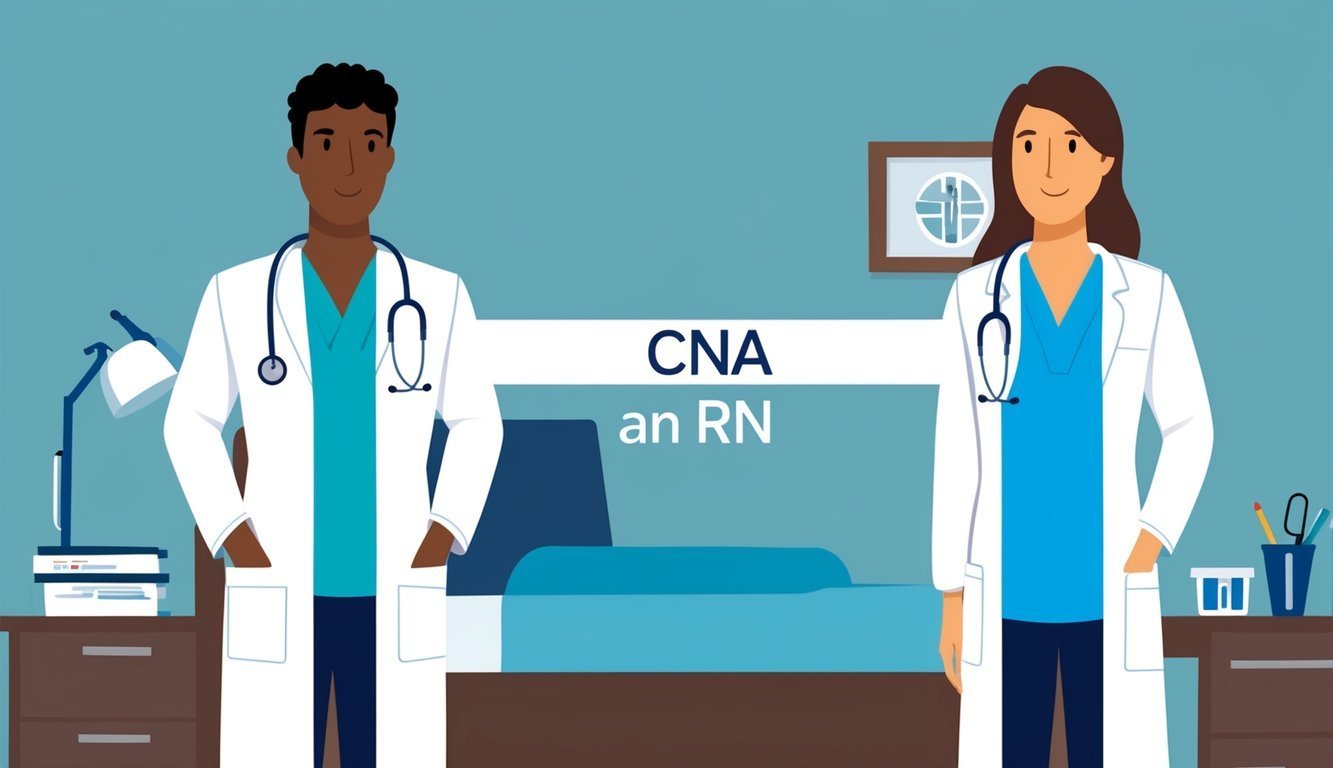Becoming a Certified Nursing Assistant (CNA) before pursuing a Registered Nurse (RN) license is a common path for many aspiring nurses.
While it is not a strict requirement, doing so can significantly enhance your skills in patient care and provide hands-on experience that is invaluable during nursing school.
This experience can help you build confidence and understand the foundational aspects of patient care.
As you consider your options, it’s essential to weigh the benefits and challenges of starting as a CNA.
Working in this role allows you to engage directly with patients, which can solidify your commitment to the nursing profession.
Research indicates that many nursing students with CNA experience feel better prepared for the demands of their RN training and future nursing roles.
If you decide to take this route, you can explore various CNA programs that fit your schedule and educational goals.
Many nursing schools even offer bridge programs that recognize your CNA training, making your transition into RN studies smoother.
Understanding this pathway can help you make informed decisions about your nursing career.
Understanding the Roles

In the nursing field, the roles of Certified Nursing Assistants (CNAs) and Registered Nurses (RNs) differ significantly despite both being vital to patient care.
Familiarizing yourself with these roles will provide clarity on their responsibilities and how they fit into the healthcare system.
Certified Nursing Assistant
As a Certified Nursing Assistant, you are primarily responsible for providing direct patient care.
Your duties include assisting with daily activities such as bathing, dressing, and feeding patients, especially in long-term care facilities.
Essential responsibilities include:
- Monitoring Vital Signs: CNAs often check patients’ blood pressure, temperature, and other key indicators.
- Assisting with Mobility: Helping patients move safely, whether transferring them from bed to chair or ensuring they can walk without falling.
- Providing Emotional Support: Offering companionship to patients can improve their overall well-being.
This role requires hands-on experience and serves as a foundational stepping stone for those considering a nursing career.
Registered Nurse
Registered Nurses take on a more complex set of responsibilities.
In addition to providing care, you analyze patient conditions and formulate nursing care plans.
RNs work in various environments, including hospitals and clinics, where they perform critical assessments.
Key responsibilities involve:
- Administering Medications: RNs ensure that patients receive the correct medications and monitor for side effects.
- Educating Patients: You educate patients and families on health conditions, prevention, and post-treatment care, fostering better health outcomes.
- Collaborating with Healthcare Teams: Effective communication with doctors and other healthcare providers is crucial for holistic patient care.
The RN role requires more extensive education and training than that of a CNA but offers greater opportunities for career advancement.
Educational Pathways
Understanding the various educational pathways is crucial for your journey from a Certified Nursing Assistant (CNA) to a Registered Nurse (RN).
These pathways include training programs, nursing program requirements, and the pursuit of a Bachelor of Science in Nursing (BSN).
CNA Training Program
To start your career as a nursing assistant, you must complete a CNA training program.
Typically, these programs are state-approved and can be completed in several weeks to a few months.
The curriculum often covers essential topics like infection control, patient care, and communication skills.
Upon completion, you must pass a certification exam to become licensed.
The demand for CNAs is significant, providing you with practical experience that is beneficial for furthering your nursing education.
Many nursing schools recognize this background as a strong foundation for more advanced roles, including RN programs.
You can explore various CNA training programs to find one that suits your needs.
Nursing Program Requirements
Once you decide to advance from CNA to RN, you need to fulfill specific nursing program requirements.
Each nursing school may have unique prerequisites, but generally, you will need your high school diploma or equivalent, along with completed coursework in subjects like biology and chemistry.
Many programs also require letters of recommendation and standardized test scores.
Understanding these requirements early will help you plan effectively.
Each nursing program might have tailored bridge programs designed for those transitioning from CNA roles, making the transition smoother.
For detailed steps, check CNA to RN programs.
BSN Degree
Pursuing a Bachelor of Science in Nursing (BSN) is often regarded as the gold standard in nursing education.
A BSN program typically spans four years, covering comprehensive coursework and clinical practice.
These programs prepare you for the NCLEX-RN exam, which is essential for RN licensure.
Additionally, BSN programs focus on critical thinking, ethics, and leadership, essential for modern healthcare environments.
Many universities also offer accelerated BSN options for individuals with prior degrees.
You can explore various BSN degree programs that cater to your educational needs and career goals.
Career Progression

Understanding the pathways from Certified Nursing Assistant (CNA) to Registered Nurse (RN) reveals significant opportunities for career growth and diversification of job roles.
You can maximize your potential in the nursing field by leveraging your CNA experience.
From CNA to RN
Starting your career as a CNA provides a solid foundation for advancing to an RN.
Many nursing schools have programs designed specifically for CNAs looking to become RNs.
These programs often recognize your prior experience, allowing for a smoother transition into more advanced nursing roles.
The training includes both practical and theoretical aspects.
Completing an accredited nursing program, such as an Associate Degree in Nursing (ADN) or a Bachelor of Science in Nursing (BSN), is essential for becoming an RN.
Not only will you gain in-depth knowledge, but you’ll also be better equipped for various specializations within nursing.
Job Opportunities and Growth
The job market for RNs is robust, especially for those with CNA experience.
According to the Bureau of Labor Statistics, employment opportunities for RNs are expected to grow significantly in the coming years.
This growth is driven by factors such as an aging population and increased healthcare needs.
In hospital settings, RNs frequently oversee CNAs, providing mentorship and guidance.
Long-term care facilities also highly value RNs who have hands-on experience as CNAs.
Furthermore, RNs typically enjoy higher salaries compared to CNAs, with average annual incomes more than double that of CNAs.
This salary increase reflects the additional responsibilities and expertise required in the RN role.
Your decision to advance from CNA to RN opens doors to various roles and specializations, enhancing both your job satisfaction and financial prospects.
Licensing and Certification
Understanding the licensing and certification processes is essential for your journey from a Certified Nursing Assistant (CNA) to a Registered Nurse (RN).
Different steps and requirements shape your career in the nursing field.
Certification Examination for CNAs
To become a CNA, you must complete a state-approved training program, which includes a minimum of 75 hours of instruction.
This training consists of both classroom learning and clinical practice.
After your training, you must pass the certification examination.
This consists of a written test and a clinical skills evaluation.
You should be prepared to demonstrate essential skills such as patient safety, hygiene, and basic care techniques.
Each state has its specific requirements, so it is crucial to check your state’s guidelines.
You can find detailed information and resources about CNA certification here.
NCLEX-RN for Registered Nurses
Becoming a Registered Nurse requires passing the NCLEX-RN examination after completing an accredited nursing program.
The NCLEX-RN tests your knowledge and skills necessary for safe and effective patient care.
To qualify for the exam, you must have a nursing degree from an accredited institution.
Your preparation will involve studying topics such as pharmacology, patient care, and health management.
The NCLEX-RN is a comprehensive test that uses a computerized adaptive format, adjusting the difficulty of questions based on your answers.
This makes thorough preparation essential.
To learn more about the NCLEX-RN requirements and study resources, visit this site.
Financial Considerations
Pursuing a nursing career entails various financial considerations.
Understanding tuition costs and available financial assistance can significantly impact your path from CNA to RN.
Tuition and Expenses
The cost of nursing programs varies widely based on the institution and location.
Community colleges may charge lower tuition than four-year universities.
As a prospective student, you can expect to pay anywhere from $5,000 to $30,000 per year.
Additional expenses include textbooks, supplies, uniforms, and clinical fees.
These can add another $1,000 to $5,000 to your overall cost.
Sample Tuition Costs:
| Program Type | Average Annual Tuition |
|---|---|
| Community College | $5,000 – $15,000 |
| University/College | $10,000 – $30,000 |
| Accelerated Programs | $20,000 – $60,000 |
Assessing these costs early on can help you plan your finances effectively.
Financial Aid Options
Various financial aid options can ease the burden of nursing program costs.
Scholarships specifically for nursing students can cover a significant portion of tuition.
Organizations like the American Nurses Association offer resources to find scholarships.
You may also qualify for federal student aid, which includes loans and grants.
The Free Application for Federal Student Aid (FAFSA) is a good starting point for exploring these options.
Tuition reimbursement programs offered by employers, particularly for healthcare workers, can also help.
Many hospitals and clinics provide financial support for employees pursuing further education.
Financial Aid Opportunities:
- Scholarships
- Grants
- Federal Loans
- Tuition Reimbursement Programs
Exploring these financial pathways can significantly alleviate obstacles in your transition from CNA to RN.

